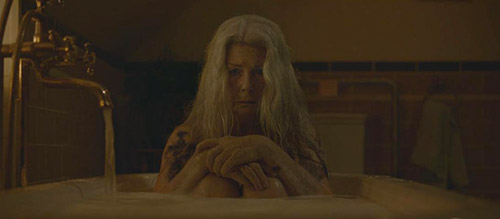Relic (2020) BFI LFF Review
Relic (2020)
Director: Natalie Erika James
Screenwriters: Natalie Erika James, Christian White
Starring: Emily Mortimer, Robyn Nevin, Bella Heathcote
As assured of a feature directorial debut as Jordan Peele’s Get Out, as terrifying a filmmaking introduction as Ari Aster’s Hereditary, and the best horror film to come from Australia since Jennifer Kent’s remarkable The Babadook, Natalie Erika James’ Relic (2020) starring Emily Mortimer, Robyn Nevin and Bella Heathcote is a surprising, twisted and terrifying film that is certifiably the first great horror of the 2020s.
“This house feels bigger than it used to.”
Opening with a tantalising shot of water pouring down carpeted wooden stairs in an old Australian mansion, an elderly woman stood with towel in hand and staring at the flicker of the lights on her Christmas tree, Relic instantaneously sets out its stall as an atmospheric horror capable of keeping you on edge and awaiting a jump scare you’re almost certain will come but can never quite tell when. It’s the kind of prologue that would typically hint at the type of scary you’re in for, be it supernatural, body horror, shock factor or slow-burning, but Relic leaves the question unanswered, instead placing you more on edge as the moments turn into minutes of prolonged anticipation in its opening act, asking you for much of its first half to imagine what terror lurks just around the corner, what horrors are approaching from just out of sight. At first, much of its scariness is implied, but it’s far from boring, the hints of a coming terror ramping up anxiety at a steady, consistent and somewhat ominous pace. First a loud bang, then a light turning on in the garden, then a shadow ominously approaching the crack in a door.
It’s a cerebral type of horror, asking you to delve into your own mind for the worst type of scary you can imagine, placing you in the position of a person fighting the fears that exist within their own brain; appropriate for a film allegorically exploring the effects of dementia.
Natalie Erika James’ presence as both co-screenwriter and director is vital to the success of Relic in all aspects, and particularly that of its allegory. This film is one made by women about women, starring almost exclusively an all-woman cast, and as well as its exploration of the scary degradation of the mind through dementia, it unravels the anxieties of being a woman in a family lineage unlike many films put to screen since the aforementioned The Babadook. The comparisons between James’ work and that of Jennifer Kent’s on the 2014 horror hit are palpable, the anxieties of motherhood and womanhood coming to life for a terrifying ninety or so minutes, the expressions of such refusing to be pigeon holed into one type of horror or another, instead encompassing elements of each to produce something more unexpected and altogether more terrifying.
At the head of James’ cast are three terrific performances from Bella Heathcote, Emily Mortimer and family matriarch Robyn Nevin, each of whom express the anxieties and attitudes of their ages and roles within the family dynamic. Heathcote, as the youngest, seems more apathetic and logical to the issues at first but becomes overrun by anxieties, noticing smaller things that her mother, Emily Mortimer, fails to see, the actor’s expressions of such proving the value of her fledgling reputation. Mortimer, as her mother and the middle member of three generations worth of family, carries a weight of expectation and obligation that her daughter remains somewhat free from, and the way Mortimer carries this in her physicality – shoulders hunched over as she writes at a makeshift desk, brows set low on the face – is nothing short of unmissable. Yet it is Robyn Nevin as the 80 year old Edna battling her own deterioration who is most spectacular, this late career performance offering moments of intimacy and stretches of fear alongside some genuinely terrifying behaviour, Nevin enhancing every aspect of her character in every single scene to offer nothing short of a true gift to James’ film and to each of us watching it.
When remembering Relic, the standout features in the writing, direction and performances seem indecipherable from its work in terms of cinematography and sound design, proving the worth of each. Here, the use of shadow is the standout aspect of the photography (though there are some truly spectacular moments involving the metaphysical that are certain to stick with you), and camera movements are steady yet expressionistic. Meanwhile, the sound design is – and this is no exaggeration – perfect. Creaks and thuds in the house are coupled with the piercing high notes of string instruments, a leitmotif of scratching-like noise forcing anticipation for whatever horror is to come next and planting the fear of the piece firmly in your subconscious. The work is nothing short of Best of 2020 worthy, and a genuine high point of an already spectacular concoction.
Relic (2020) is certifiably the unmissable debut feature of the year, a contemporary horror offering all the hallmarks of the greats and then some. This powerful allegorical tale offers something more vast than your usual, neatly defined horror and is sure to please any and all who are appreciative of film in its most sophisticated and imaginative form. Natalie Erika James has taken a lead pipe to the glass ceiling with this debut, and has as such ensured that we all have another top name to look out for in the future, Relic truly being of the highest class both within the genre and the form in a more wider context; a genuine triumph.
21/24


